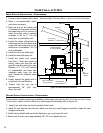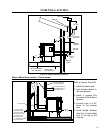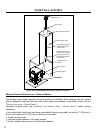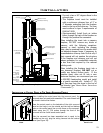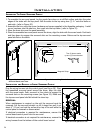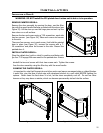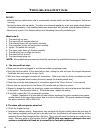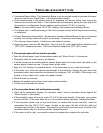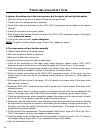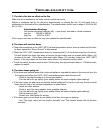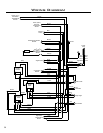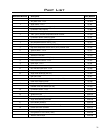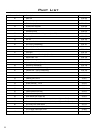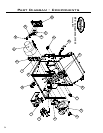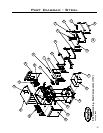
Troubleshooting
5. Ignitor- Everything else in the stove operates but the ignitor will not light the pellets
√ Make sure the burn pot liner is up tight and square to the ignitor tube.
√ Check to see if the exhaust blower is operating.
√ Check all the electrical connections on the 120°F (49°C) temperature sensor located on the exhaust
channel.
√ Check the connections at the ignitor socket.
√ Place a jumper wire between the two (2) leads on the 120°F (49°C) temperature sensor. If the ignitor
works, replace the sensor.
√ If the ignitor does not work, replace the ignitor
NOTE: The ignitor should be bright orange in color. If not, replace the ignitor.
6. The auger motor will not function normally
√ Check for obstructions in the hopper system.
√ Make sure the exhaust blower is operating.
√ Make sure the dial-a-fire is turned on.
√ Unplug the stove and open the side and back panels.
√ Check all the connections to the auger motor, auger dial-a-fire, vacuum sensor, 200°F (93°C)
temperature sensor and the timing control module against the “WIRING DIAGRAM” in this manual.
√ Check the condition of the vacuum hose (located on the left side of the stove). It should not be cracked
or torn and should be installed on the top air inlet tube on the vacuum sensor.
√ Check the manual reset button on the 200°F (93°C) temperature sensor. If this sensor has been
tripped, check for the cause of the over-heating before pushing the red button in. Check auger for
movement.
√ If the auger still does not work, then apply 115 V AC directly to the auger motor. If the auger motor
does not work, replace it.
√ By pass the 200°F (93°C) temperature sensor with a jumper wire. Check the auger. If the auger works
replace the sensor.
√ Check the vacuum sensor by placing a jumper wire between the blue wires that are attached to the
sensor. If the auger works, test to see if the exhaust blower is producing enough firebox vacuum.
√ To test the exhaust vacuum, place a magnehelic gauge in the sensor end of the vacuum tube. It should
read 0.23” W.C. If the reading is good then replace the vacuum sensor.
√ If the auger motor still does not work, then attempt to by-pass the auger dial-a-fire control by removing
the leads from the timing control module’s second delay pins and placing a jumper across the pins. If
the auger now cycles very quickly, test the dial-a-fire potentiometer. If the auger did not cycle, then
replace the timing control module.
√ To test the dial-a-fire potentiometer. The potentiometer should have a range of 34 KΩ to 900 KΩ (±
10%). If the range is not close, then replace the potentiometer.
√ Check the voltage across the load pins of the timing module. It should be around 1 V to 2 V, cycling to
line voltage during an auger pulse. If not, replace the timing control module.
√ Call your local dealer for service.
28



